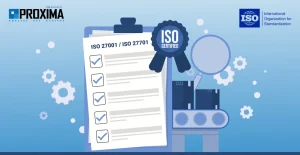Did you know that pharmaceutical sales representatives spend up to 40% of their valuable time on administrative tasks instead of engaging with healthcare professionals? This startling statistic highlights a critical inefficiency in the pharmaceutical industry that innovative AI-powered CRM systems, like Proxima Cloud CRM, are now addressing head-on.
Table of Contents
- The Pharmaceutical Industry: Before and After AI
- The Importance of CRM in the Pharmaceutical Industry
- AI-Powered CRM: A Game-Changer for Pharma
- Embracing the Future with Advanced CRM Solutions
In today’s rapidly evolving pharmaceutical landscape, the integration of Artificial Intelligence (AI) with Customer Relationship Management (CRM) systems is revolutionizing how companies interact with healthcare professionals (HCPs), patients, and other stakeholders.
This synergy is not just an incremental improvement; it’s a paradigm shift that’s redefining the very essence of customer engagement in the pharma sector. As we delve into this transformative journey, we’ll explore how AI-enhanced CRM solutions are becoming indispensable tools for pharmaceutical companies striving to stay ahead in a competitive market.
The Pharmaceutical Industry: Before and After AI
The pharmaceutical industry in the United States has long been a cornerstone of innovation and healthcare advancement. However, the landscape has dramatically shifted with the advent and implementation of AI across various facets of the industry.
Before AI: Traditionally, pharmaceutical companies relied heavily on manual processes and historical data to drive decision-making. Sales representatives often worked with limited insights, struggling to personalize their approach to different healthcare professionals. Market research was time-consuming and often failed to capture real-time trends. Drug discovery was a lengthy and costly process, with high failure rates in clinical trials.
After AI: The integration of AI has catalyzed a transformation across the entire pharmaceutical value chain. AI algorithms now analyze vast amounts of data to identify patterns and insights that human analysts might miss. This has led to:
- Accelerated drug discovery: AI models can predict the success rate of potential drug candidates, significantly reducing the time and cost of bringing new medications to market.
- Enhanced clinical trials: AI helps in patient selection for trials, predicting outcomes, and identifying potential side effects earlier in the process.
- Personalized marketing: AI-powered CRM systems enable highly targeted and personalized communication with HCPs, improving engagement and effectiveness.
- Predictive analytics: Companies can now forecast market trends, patient needs, and potential challenges with greater accuracy.
- Improved supply chain management: AI optimizes inventory levels and predicts demand fluctuations, ensuring better product availability.
The impact of AI on the pharmaceutical industry has been profound, with companies leveraging these technologies seeing significant improvements in efficiency, cost-effectiveness, and patient outcomes. As we move forward, the role of AI in pharma is only set to grow, with those embracing this technology gaining a significant competitive edge.
The Importance of CRM in the Pharmaceutical Industry
In the complex ecosystem of the pharmaceutical industry, a robust Customer Relationship Management (CRM) system is not just a nice-to-have; it’s a critical tool for success. The right CRM can be the difference between a company that thrives and one that struggles to keep up with the rapidly changing landscape.
Why CRM Matters in Pharma
- Personalized Engagement: With thousands of healthcare professionals to interact with, personalization is key. A good CRM system allows sales representatives to tailor their approach based on each HCP’s preferences, specialties, and past interactions.
- Compliance Management: The pharmaceutical industry is heavily regulated. CRM systems help ensure that all interactions with HCPs are compliant with industry regulations and company policies.
- Data-Driven Decision Making: By centralizing data from various touchpoints, CRM systems provide valuable insights that can inform strategic decisions, from resource allocation to product development.
- Omnichannel Coordination: Modern HCPs prefer to engage through various channels. A CRM system helps coordinate these interactions, ensuring a consistent experience whether the engagement is in-person, via email, or through digital platforms.
- Performance Tracking: CRM systems allow companies to track the performance of their sales and marketing efforts, enabling continuous improvement and optimization.
Get a Demo of Proxima Cloud CRM Today
Want to learn more about transforming your pharmaceutical sales operations? to discover how Proxima Cloud CRM can revolutionize your business. Contact Us
Types of CRM Systems
When it comes to CRM systems in the pharmaceutical industry, there’s no one-size-fits-all solution. Let’s explore three different approaches:
- High-Code CRM Systems:
- Highly customizable and feature-rich
- Require significant IT resources for implementation and maintenance
- No-Code CRM Systems:
- User-friendly and quick to implement
- Limited customization options
- Low-Code CRM Systems:
- Balance between customization and ease of use
- Faster implementation than high-code systems
- More flexible than no-code options
- Example: Proxima Cloud CRM
The low-code approach, exemplified by Proxima Cloud CRM, offers a compelling middle ground. It provides the flexibility to adapt to specific pharmaceutical industry needs without the complexity and resource requirements of high-code systems. This approach allows for rapid deployment and easy customization, making it an attractive option for pharmaceutical companies looking to optimize their CRM strategy.
AI-Powered CRM: A Game-Changer for Pharma
The integration of Artificial Intelligence into CRM systems is transforming the pharmaceutical industry, offering unprecedented capabilities that enhance customer engagement, streamline operations, and drive better business outcomes. Let’s explore the key features that make AI-powered CRM a must-have tool for modern pharmaceutical companies:
- Predictive Analytics:
AI algorithms analyze historical data to forecast future trends, helping companies anticipate market changes and customer needs. This enables proactive decision-making and strategy formulation. - Personalized Engagement:
AI-driven CRM systems can analyze HCP preferences, past interactions, and behavior patterns to recommend the most effective engagement strategies. This level of personalization significantly improves the relevance and impact of communications. - Automated Insights:
AI can automatically generate insights from vast amounts of data, highlighting important trends, opportunities, and potential issues that might otherwise go unnoticed. - Intelligent Scheduling:
AI algorithms can optimize sales representatives’ schedules, ensuring they meet with the right HCPs at the right time, maximizing the impact of each interaction. - Chatbots and Virtual Assistants:
AI-powered chatbots can handle routine inquiries, freeing up human resources for more complex tasks. They can also assist sales representatives by providing real-time information during HCP interactions. - Sentiment Analysis:
AI can analyze the sentiment of customer interactions, helping companies gauge the effectiveness of their engagement strategies and identify areas for improvement. - Compliance Monitoring:
AI algorithms can monitor interactions for compliance with industry regulations, flagging potential issues before they become problems. - Territory Alignment:
AI can analyze multiple factors to determine optimal territory assignments for sales representatives, ensuring efficient coverage and maximizing engagement opportunities. - Multichannel Optimization:
AI-powered CRM systems can determine the most effective communication channels for each HCP, ensuring messages are delivered through the preferred medium at the optimal time.
These features, when combined in a comprehensive CRM solution like Proxima Cloud CRM, create a powerful tool that can significantly enhance a pharmaceutical company’s ability to engage with HCPs, manage resources efficiently, and drive business growth.
Get a Demo of Proxima Cloud CRM Today
Want to explore how Proxima Cloud CRM can eliminate these challenges in your pharmaceutical sales operations? to learn more about our innovative solutions. Contact Us
Embracing the Future with Advanced CRM Solutions
As we’ve explored throughout this article, the integration of AI into CRM systems is not just an incremental improvement—it’s a transformative shift that’s reshaping the pharmaceutical industry. The companies that embrace these advanced solutions are positioning themselves at the forefront of innovation, ready to meet the challenges and opportunities of tomorrow’s healthcare landscape.
Proxima Cloud CRM exemplifies this new generation of AI-powered CRM solutions. By leveraging cutting-edge AI technologies within a flexible, low-code framework, Proxima Cloud CRM offers pharmaceutical companies a unique blend of power and adaptability. Its omnichannel platform ensures seamless communication across various channels, while the AI-driven insights enable more strategic, data-informed decision-making.
The benefits of adopting such an advanced CRM system extend far beyond improved efficiency. It’s about creating deeper, more meaningful relationships with healthcare professionals. It’s about gaining the agility to respond quickly to market changes. And ultimately, it’s about improving patient outcomes by ensuring that the right information and treatments reach the right healthcare providers at the right time.
As you consider the future of your pharmaceutical operations, ask yourself: Are you equipped with the tools to thrive in this AI-driven era? Is your current CRM system empowering your teams to engage effectively in an increasingly complex healthcare ecosystem?
Conclusion
Pharmaceutical sales teams face multifaceted challenges that require innovative solutions. From managing the complexities of manual data entry to building and maintaining customer relationships in a highly regulated landscape, these obstacles demand sophisticated technological interventions. Proxima Cloud CRM’s AI-powered platform offers a comprehensive solution to these challenges, enabling pharmaceutical companies to:
- Streamline operations through automated workflows
- Enhance customer engagement with personalized interactions
- Ensure regulatory compliance through built-in safeguards
- Drive better business outcomes through data-driven decision making
- Facilitate seamless cross-functional collaboration
The pharmaceutical industry stands at a crucial juncture where traditional approaches to customer relationship management must evolve to meet modern challenges. AI-powered CRM systems, particularly Proxima’s Cloud CRM innovative platform, offer promising solutions for addressing these challenges while enabling pharmaceutical companies to deliver superior value to healthcare providers and ultimately improve patient outcomes.
For a deeper understanding of how Proxima Cloud CRM can help your organization navigate these challenges, with our team of pharmaceutical CRM experts, Schedule a personalized demo











